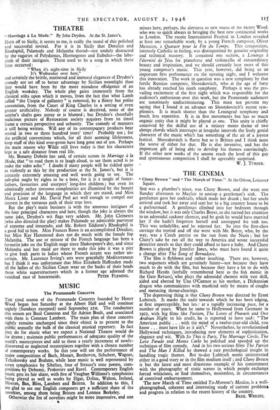MUSIC
The Promenade Concerts
THE 52nd season of the Promenade Concerts founded by Henry Wood began last Saturday at the Albert Hall and will continue nightly (Sundays excepted) until September mt. The conductors this season are Basil Cameron and Sir Adrian Boult, and associated with them is Constant Lambert. The main plan of these concerts rightly remains unchanged since their object is to present to the public annually the bulk of the classical musical repertory. In fact they do for music what we expect a National Theatre would do for drama ; maintain public performances of adequate quality of the world's masterpieces and add to these a yearly increment of newly- discovered or neglected masterpieces together with a chosen number of contemporary works. So this year will see the performance of major compositions of Bach, Mozart, Beethoven, Schubert, Wagner, Tchaikovsky and Brahms, while later music is well represented by seven symphonies by Sibelius, four of Strauss's tone poems, com- positions by Debussy, Prokoviev and Ravel. Contemporary English music gets its fair share, with five of Vaughan Williams's symphonies being played as well as works by Elgar, Delius, Walton, Ireland, Moeran, Bax, Bliss, Lambert and Britten. In addition to this, I ant glad to see our English composers get a sufficient share of ihe novelties, among them being Britten and Lennox Berkeley.
Otherwise the list of novelties might be more impressive, and one misses here, perhaps, the alertness to new music of sir Henry Wood, who was so quick always in bringing the best new continental works to London. The recent International Festival in London revealed at least one remarkable work, by a. young French composer, Oliver Messaien, a Quatuor pour la Fin du Temps. This composition, intensely Catholic in feeling, was distinguished by genuine originality and technical mastery. It contained one section, a Louange a reternite de lesu for pianoforte and violoncello of extraordinary beauty and inspiration, and we should certainly hear more of this young composer's music. This year, however, did bring us an important first performance on the opening night, and I welcome this innovation. The work in question was a new symphony by that fertile Russian composer, Shostakovitch, who at the age of forty has already reached his ninth symphony. Perhaps it was the pre- vailing excitement of the first night which was responsible for the audience's enthusiasm over this work, but the Promenade audiences are notoriously undiscriminating. This must not prevent my saying that I found it an advance on Shostakovitch's recent -sym- phonies. It is much shorter than the Leningrad symphony and much less repetitive. It is in five movements but has so much organic unity that it might be played as one. This unity is chiefly contrived by the skilful use of a sinister motto theme of two abrupt chords which interrupts at irregular intervals the lively genial character of the music which has something of the air of a joyous festival. Shostakovitch is fluent but so is Britten and I think none the worse of either for that. He is also inventive, and has the important gift of being able to develop his themes convincingly. If the other new works of the season reach the level of this gay and spontaneous composition I shall be agreeably surprised.
W. J. TURNER.


























 Previous page
Previous page